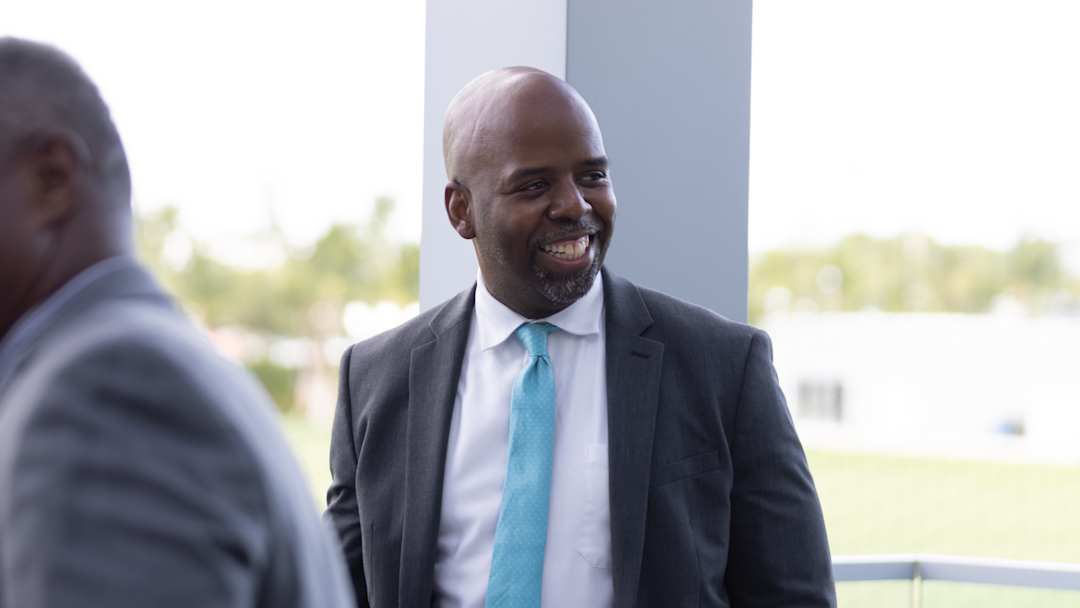Jason Jenkins’ legacy continues to shine brightly in the hearts of the Miami Dolphins community and far beyond, as he receives one of the highest honors in the sports world—an induction into the Hall of Fame. The former Dolphins Senior Vice President of Communications and Community Affairs, who passed away unexpectedly in 2022 at the age of 47, was posthumously honored for his extraordinary impact on the franchise, the NFL, and the South Florida community. The announcement came with emotion and deep reverence from league officials, team executives, fans, and civic leaders, all of whom recognized Jenkins not just for his professional excellence but for the powerful legacy of humanity and service he left behind.
Jenkins was more than a football executive—he was a beacon of hope, change, and compassion. During his 14-year tenure with the Dolphins, he spearheaded numerous initiatives that bridged the gap between the organization and the broader community, especially focusing on social justice, education, and youth empowerment. Whether it was leading food drives during natural disasters, organizing scholarships for underserved students, or helping players leverage their platforms for meaningful change, Jenkins approached his role with unmatched authenticity and vision.
NFL Commissioner Roger Goodell called Jenkins “a giant in every sense of the word—not just for what he accomplished, but for the way he lived.” Goodell’s remarks during the induction ceremony were echoed by team owner Stephen Ross, who called Jenkins “the soul of the Miami Dolphins.” Ross highlighted Jenkins’ unique ability to make everyone feel valued, seen, and heard—whether it was a rookie player, a fan, or a local resident needing help. “Jason didn’t just talk about change; he embodied it,” Ross said.
The Hall of Fame honor recognizes not just Jenkins’ accomplishments within football, but also his broader influence in reshaping the intersection between sports and civic responsibility. Jenkins was instrumental in launching the Dolphins’ social impact committee and played a pivotal role in the team’s response to racial injustice following the death of George Floyd. Under his guidance, the Dolphins became one of the most socially active teams in the NFL, hosting town halls, roundtable discussions, and mentoring sessions that encouraged open dialogue and community healing.
Jenkins’ influence wasn’t confined to the Dolphins’ offices or Hard Rock Stadium—it extended into classrooms, churches, neighborhoods, and city halls throughout South Florida. He was a champion of causes affecting marginalized communities and consistently used his position to elevate those around him. One of his signature programs, the “Football Unites” initiative, brought together diverse groups to promote unity and understanding across racial and socioeconomic lines. That program continues to be a cornerstone of the Dolphins’ community efforts.
His widow, Elizabeth Jenkins, accepted the honor on his behalf, delivering an emotional tribute to her late husband. Holding back tears, she spoke of Jason’s relentless passion for lifting others up. “He believed that if you had the power to help, then you had the responsibility to do it,” she said. “This honor is not just about what he did—it’s about who he was.” Their children stood by her side, each wearing a Dolphins jersey with “Jenkins” proudly displayed on the back.
Current and former Dolphins players also voiced their admiration and appreciation for Jenkins. Linebacker Jerome Baker called Jenkins “a mentor and a motivator who made you want to be better.” Quarterback Tua Tagovailoa credited Jenkins with helping him understand the importance of using his voice as an athlete. “He made sure we knew we were more than just players,” Tagovailoa said. “We were leaders in our communities—and he led by example every single day.”
The induction ceremony featured a moving montage of Jenkins’ life and work, showcasing testimonials from colleagues, community partners, and NFL leadership. It also included clips from his appearances at local schools, charity events, and youth camps—where he often delivered motivational speeches that left lasting impressions. The montage concluded with one of Jenkins’ most memorable quotes: “It’s not about what you do when the lights are on. It’s about how you treat people when no one’s watching.”
The NFL Hall of Fame’s decision to honor Jenkins posthumously is a powerful message about the evolving recognition of off-field contributions. While the Hall is best known for immortalizing elite athletes, Jenkins’ induction represents a growing acknowledgment that greatness in football includes those who shape culture, community, and character from behind the scenes.
Hall of Fame President Jim Porter emphasized this shift in perspective during the ceremony, stating, “Football is not just about the game. It’s about impact. Jason Jenkins made an impact that transcends statistics and scoreboards. His story is one that every young person entering this league should learn and remember.”
Jenkins’ impact also reached national and international circles. He served on numerous boards, including the Anti-Defamation League, Breakthrough Miami, Urban League of Broward County, and the Black Advisory Board of Baptist Health. His work earned him widespread recognition, including the Corporate Pillar Award and the Martin Luther King Jr. Leadership Award. His commitment to service extended to mentorship as well, where he often guided aspiring sports professionals of color looking to break into a competitive industry.
In the months following his passing, a scholarship fund was established in his name, supporting students committed to public service and community leadership. That fund, now in its second year, has already helped dozens of young leaders pursue their academic dreams and continue Jenkins’ legacy of impact and inclusivity.
The Hall of Fame induction is a crowning moment that ensures Jason Jenkins’ legacy will endure in the history books of football and the hearts of all who knew him. His story stands as a testament to the power of kindness, the importance of purpose, and the everlasting influence of a life lived in service to others. As the applause rang out in the Hall of Fame auditorium, it was clear that Jason Jenkins had reached the pinnacle of respect—not just for what he did, but for how he did it.
In a world where winning is often measured in touchdowns and trophies, Jason Jenkins redefined victory through empathy, leadership, and the courage to create change. His name now stands among legends—not only for his contributions to football, but for proving that character is the greatest legacy of all.



